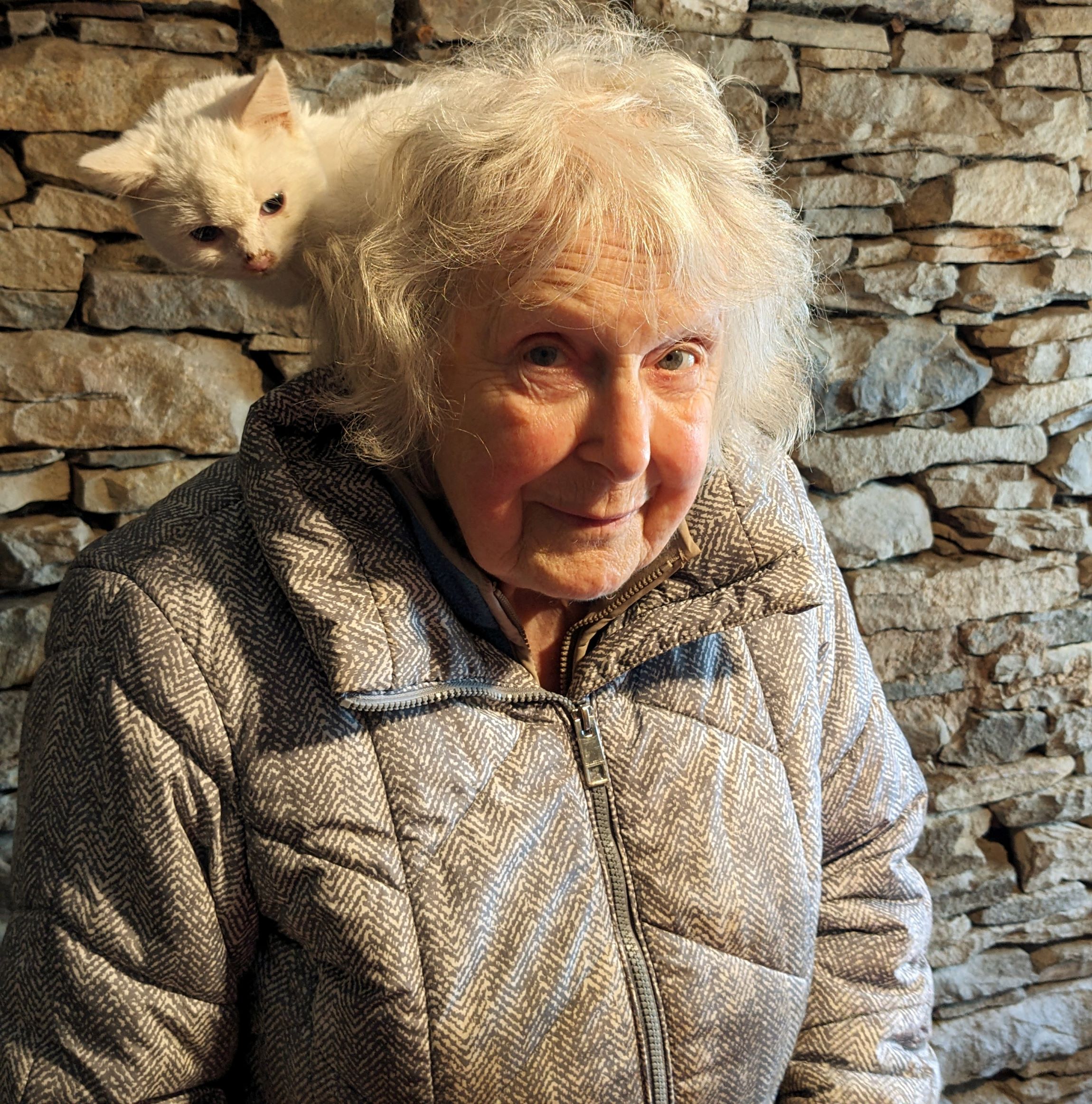
A Fur Person must be adopted by catly humans, tactful, delicate, respectful, indulgent; these are fairly rare, though not as rare as might be supposed.
May Sarton, ‘The Fur Person’
“Hello, my darlings,” Rhona Lucas says in that silly singsong voice we all adopt when speaking with animals. “How are you?”
Her darlings come from hither and thither when they hear her, some standoffish ones just taking a look, others ready for a stroke behind the ear, occasionally a snuggle, always drawn (let’s be fair here) to the promise of food. Cats and kittens, of all ages, many abilities, various levels of wellness, gargantuan and so small you can barely believe your eyes, calico-tiger-black-white-white/black-ginger-tabby-gray-splotched, mothers, impeccable cleaners, one-eyed wonders, fluffy-sleek-matted fur – in short, a veritable panoply of feline familiars.
This is An Cat Dubh Sanctuary (the black cat sanctuary), a country shelter where all cats are welcomed. Right now, Rhona reckons, she cares for about 140 – many ferals, quite a few strays, not quite as many domestic surrenders but those too, a seemingly year-round supply of kittens, and on. I volunteer at the sanctuary on Wednesday mornings, have for the better part of 18 months. Because, let’s face it, once a cat person, always a cat person. Dogs are great, they just don’t hold the same allure, as we know instinctively. I have always been in the presence of cats who have deigned to let me care for them; but now, here in Ireland, I am without one in my life for the first time. I rent a pet-free home, just as well for the moment as I travel so much. But boy oh boy, it can ache sometimes. Volunteering at An Cat Dubh fills that void a bit.
The sanctuary perfectly accommodates its residents. The truly feral (who through some wild cat communication system know they’ll get two squares a day at this lady’s house) hang out in a barn with the rescue chickens and ducks long enough to eat before wandering off again. As they get acclimated, some must say, ‘Well, here’s a good alternative to living rough,’ and they may gradually creep into one of several feral sheds closer in – buildings with doors and windows open at all times or no doors at all for a quick escape. Here are cat beds and fluffy fleeces on old chairs or tucked into corners. Getting braver yet, some, particularly in winter, will set up residence in a heated cat living room of sorts just off the kitchen of Rhona’s home, with a couple of overstuffed sofas and a large flap for quick exit. Rhona said they will allow her to sit on the sofa with them, but no touching, please.
“When I come to the front door in the morning, there they are, saying, ‘Would you just get a move on? We’re starving out here!’”
The rest of the cats, the ones I hang out with for the most part, are either longer term residents and used to humans pretty much (some so much so that they are insistent on getting their attention, some quite skittish still) or mothers and kittens in various stages of childhood and adolescence. Most reside in one of several converted horse sheds, with a cement patio of sorts outside surrounded by high metal fences, with gates that can be open or closed as necessary to keep in the young or the sick, for instance, or keep out the more aggressive. These sheds-cum-homes have plenty of places to curl up, one even with a sofa and wood stove! Finally, there’s the ‘maternity unit,’ where reside nursing mothers and an ever-changing array of little ones who love their snuggles. 😊
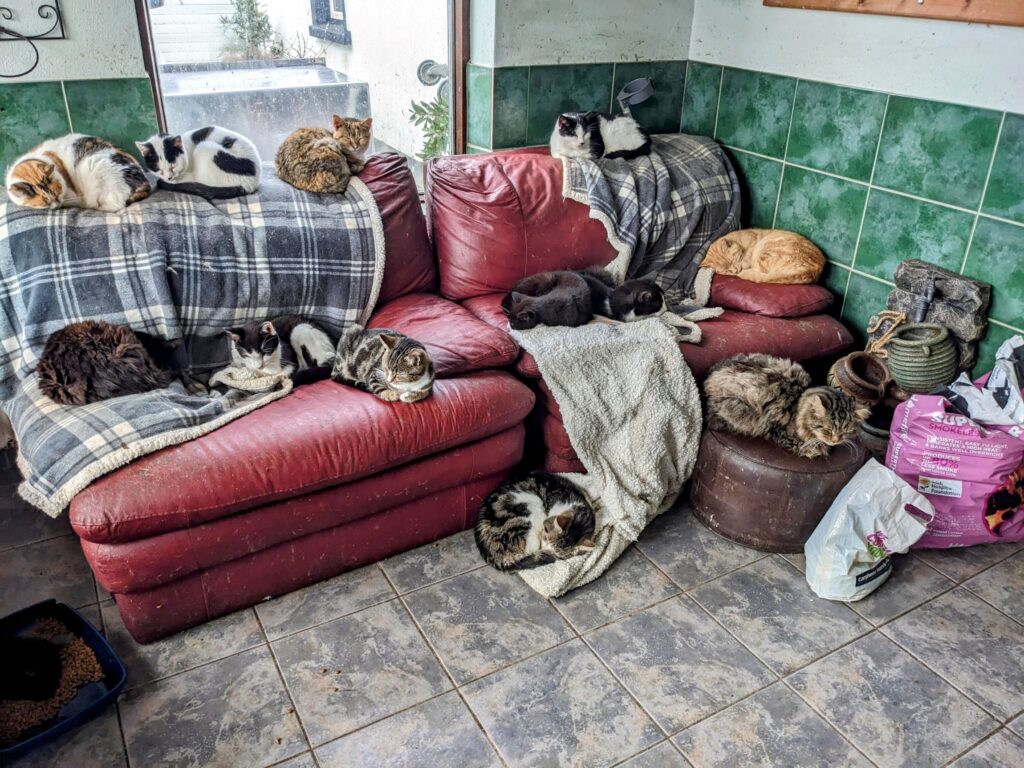
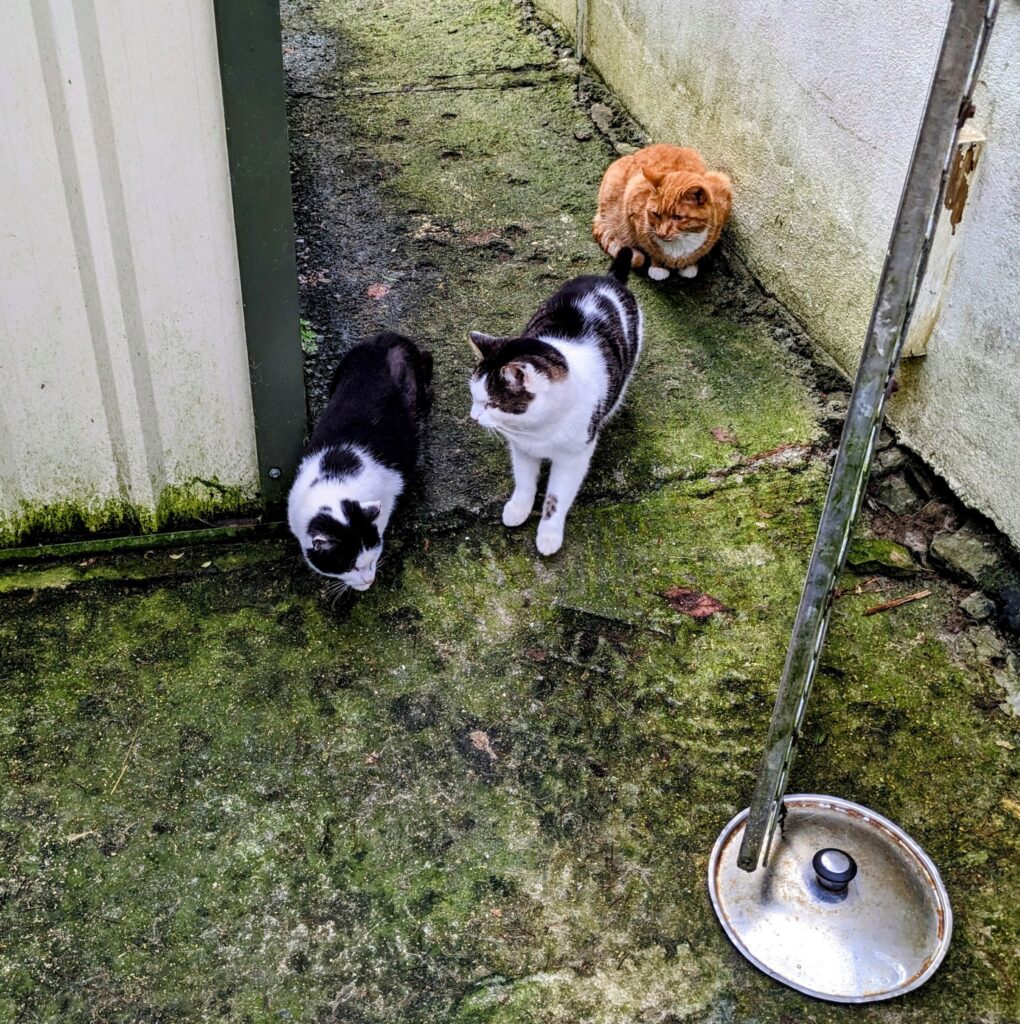
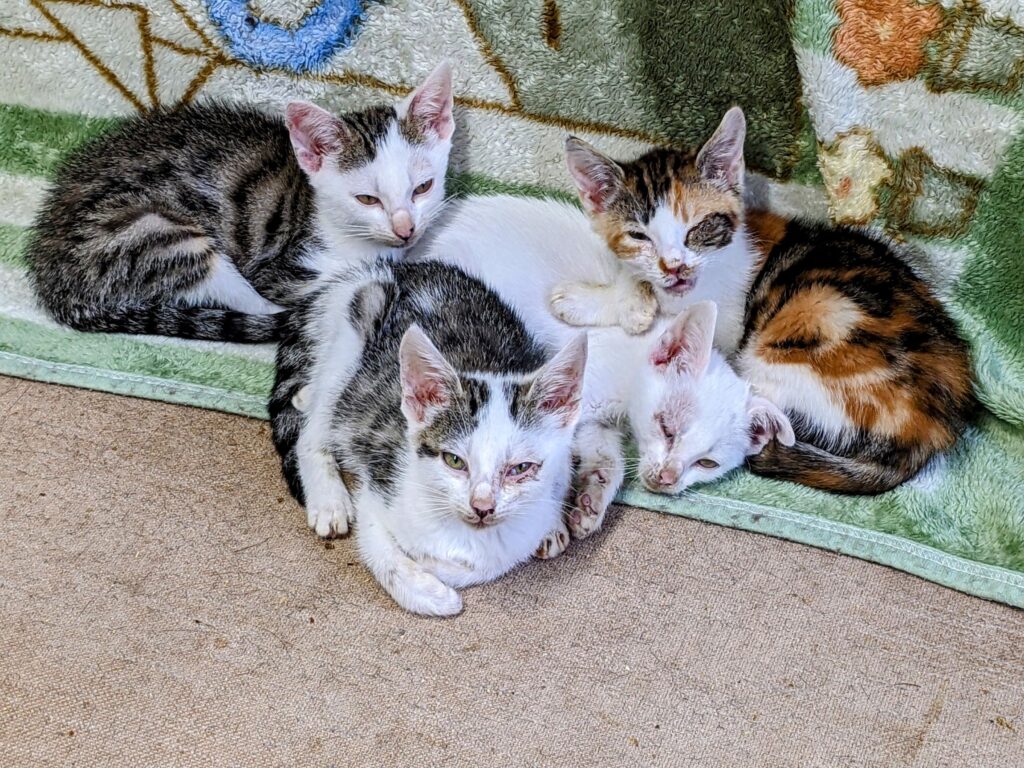
From left to right: Just some of the cats in the cat living room on a cold winter’s morning; a few of the feral-shed ferals who, trust me, would scoot away if I took one step more; a recent litter of kittens in the maternity unit, too small for their age and at various levels of wellness. (Still full of piss and vinegar, as my grandmother used to say!)
All of them need fresh litter, fresh food, fresh water, often fresh bedding; many need worming twice a day (an inevitable side product of living wild) and some need antibiotics and other medications; floors are swept and mopped; and then it’s time to start again. These are well-cared-for cats despite their numbers, and that’s on purpose.
“I give them the best food I can give them, I give them clean bedding, I try to make them as healthy as I possibly can, because they deserve it,” she said. “Many of them have had a truly difficult life. They matter to us here. We treat them with respect and dignity.”
Rhona insists that every cat including the most feral be neutered or spayed. She will crate them, take them to the vets, and release them where they were found. (TNR is the mantra in the cat shelter world: trap, neuter, release.) Often, she’ll take her talents on the road, coming crate in hand to some spot where a feral has been spotted by the side of the road. She reckons that in the 16 years since she’s run the sanctuary, generations of tomcats no longer impregnate vulnerable females, who through some twisted evolutionary fate can get pregnant as young as four months old and can have potentially three litters in one year. Kittens having kittens, for goodness sake. So hundreds of females who have been in her care over the years, while hardly living the life of luxury as a feral cat, no longer propagate. And this is key in a rural country where farmers keep barn cats who breed with ferals, who live wherever they can. The Irish Society for the Prevention of Cruelty to Animals estimated in 2022 that in excess of 200,000 feral cats live in Ireland, a situation it termed as a crisis.
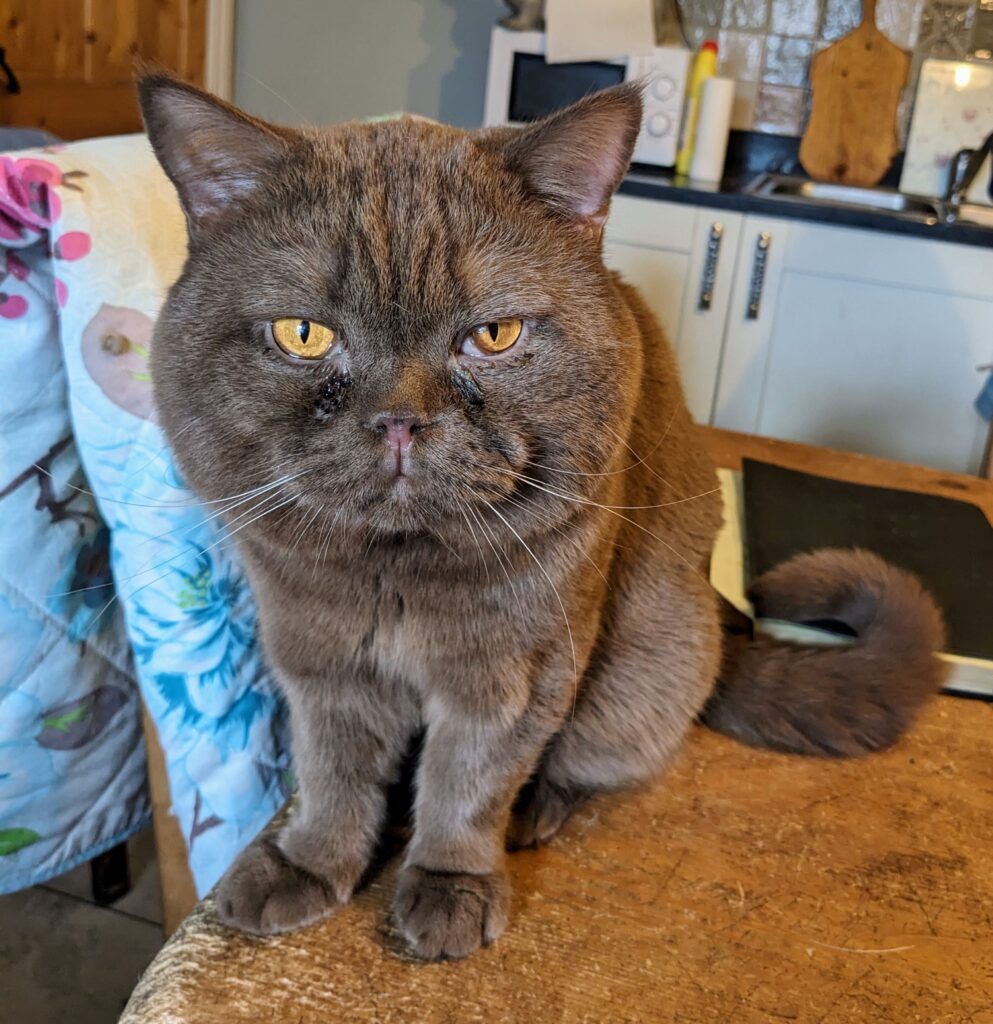
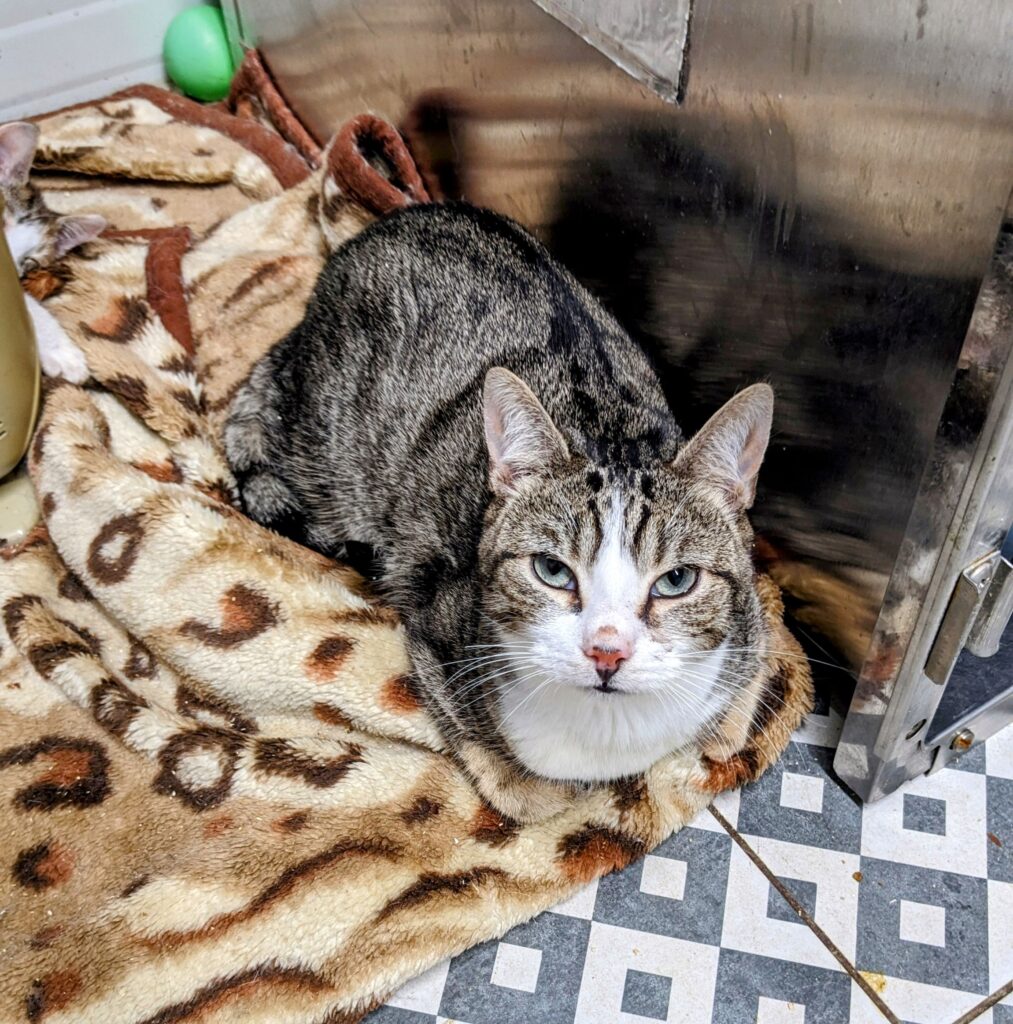
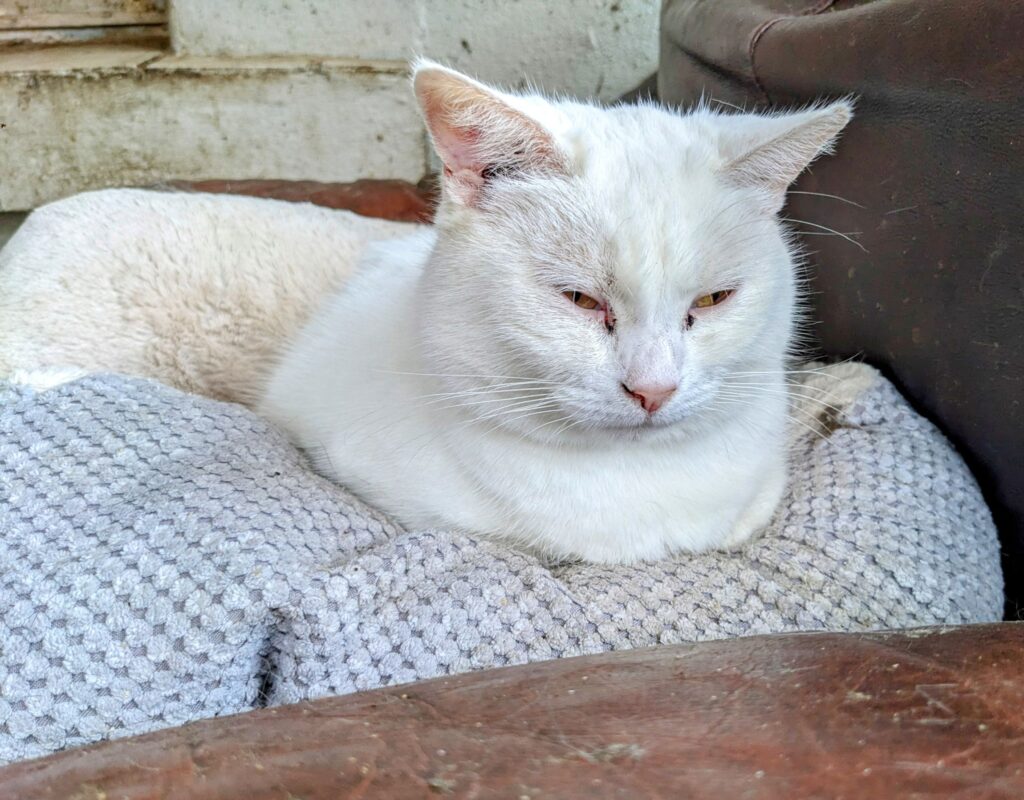
Some of the regulars, from left. This is is Phillip, an enormous cat with a heart condition who hangs out in Rhona’s kitchen. Bennie suffers from cerebella hyperplasia, a neurological disorder that renders his back legs useless. He hangs out in the maternity unit, a loving substitute mom with kittens often curled at his side. This is Icy, or as I called her Buddha-mom, because she mothered all kittens in quite a dignified way whether they were hers or not. I really wanted to take her home.
Perhaps the most heartbreaking cases are those of mothers and babies. If mom is a feral, she’s probably filled with worms which she then passes on to the youngsters, only the most hardy of whom are likely to survive. Kittens can be found in the wild, at the side of the road, under a bush, with mom maybe dead or maybe close by but frightened of humans when someone hears the mewing and crates them to bring to the sanctuary. These little ones need to be bottle fed every few hours, 24 hours a day. Rhona doesn’t get a lot of sleep… If mom is brought to the shelter while pregnant, she is given royal treatment, “She deserves some comfort so she can have her babies in safety, and she will get that here,” said Rhona. “Then we transfer them to the maternity unit, where no tomcat is going to come in and kill the kittens. Mom is spayed at six weeks, and kittens can then be rehomed if they’re healthy.”
It’s that “if they’re healthy” qualifier that can get to you. I became quite enamored of a beautiful little ginger, who was brought in with his brother. He was playful and fun, always glad to see me, quite happy to claw his way up my jacket to stand at the summit for a good view of things. One week, he was gone, and I assumed he’d been rehomed. When I asked Rhona, she told me he’d died. He was full of life one day, lethargic the next. Even though he’d been wormed faithfully, Rhona thinks he was too overwhelmed with them, born in the wild as he was.
“I could say I’m not taking any more. But what happens to them? When you find little kittens in a ditch, even if you believe they’re going to die, you are not going to say, ‘You’re not worth my time, you’re not going to survive.’ I have to feel I’ve done everything I possibly can for them.” If kittens do pass on, and this happens unfortunately not infrequently despite all Rhona’s efforts, they are cremated on the property. “I like that we do that. I feel they’re still here. They were here when they were valued, respected and loved, and the essence of them is still here,” she said.
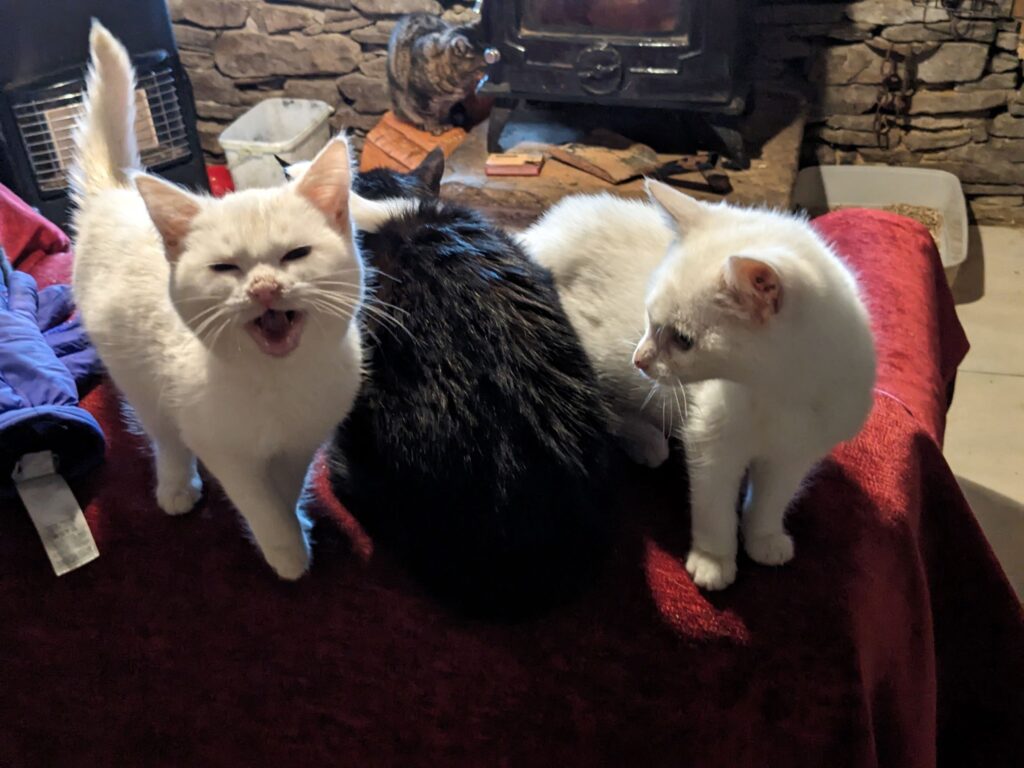
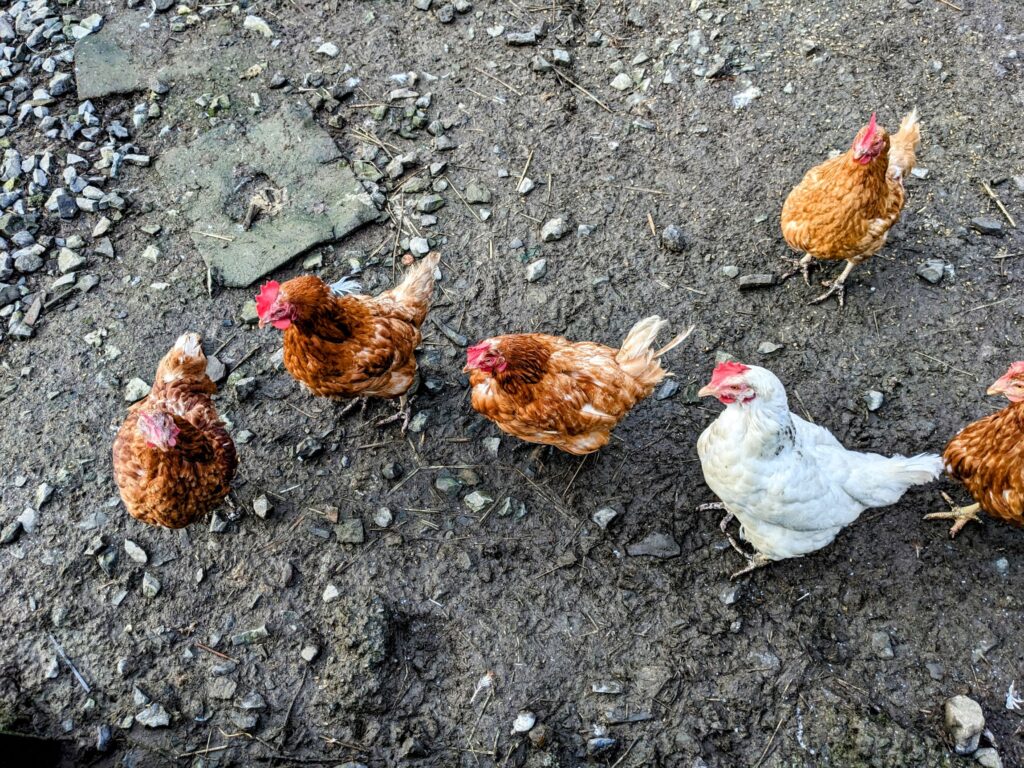
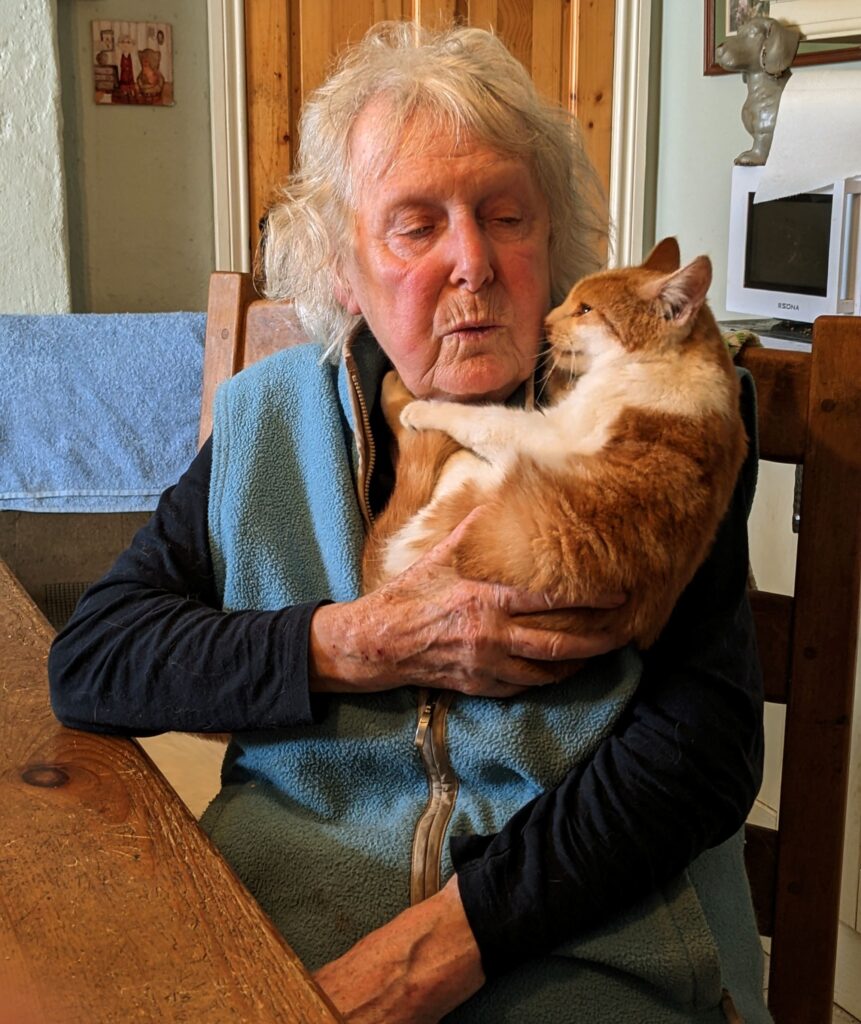
From left to right: Just plain old white kitten cuteness; some of Rhona’s rescue chickens; with Marmalade, a very affectional ginger who has a constant nasal infection and probably for that reason will stay at the sanctuary.
Rhona didn’t intend to open a shelter when, 16 years ago, she, her husband and their two cats and two dogs moved from England to Ireland, home of her forebears. “Somehow, it became implanted in people’s minds that we were animal lovers, and they started bringing over animals, particularly cats – a kitten whose mom was trampled by a cow, farmers coming and asking me to take kittens. After a while, the cats were coming thick and fast,” she said. Rhona, who holds a masters degree and a doctorate in criminal justice and child forensic studies, respectively, uses most of the pension gained from her work in those fields to subsidize the shelter. “Some people do other things with their money, but my job is to help as many animals as possible,” she said. She has also been fortunate to have volunteers that preclude the need for paid employees, and donors who make regular contributions toward the myriad supplies needed to run the shelter or who regularly pay the veterinarian. Recently, she learned the primary food donors are phasing out their funding. This may mean having to spend her entire pension on the shelter, “but I’m doing what I love doing, so it’s not a hardship,” she said.
Now 80, she’s had recent health issues but has bounced back, and continues to work on and off 24 hours a day, depending on the day. When she turned 75, she received commitments from her Facebook followers to take responsibility for one cat – not necessarily to take the cat but to be responsible for rehoming it. While the appeal needs to be renewed, “that’s the plan.” She expects the volunteers would still keep coming, still be feeding and cleaning, still emptying the litter trays. The board of trustees would step in, undoubtedly, she said. Frankly, she’s too busy, it seems to me, to be busy thinking about dying.
“I’m pragmatic about it,” she said. “Things will work out.”
***
If you would like to learn more about An Cat Dubh Sanctuary, you can follow Rhona on Facebook, https://www.facebook.com/ancatdubhsanctuary
‘Tis the season to make a donation, too, if it suits. Really the only way is through PayPal, @ancatdubhgive, or look up An Cat Dubh Sanctuary.
For a Fur Person is a cat whom human beings love in the right way, allowing him to keep his dignity, his reserve and his freedom. And a Fur Person is a cat who has come to love one or, in very exceptional cases, two human beings and who has decided to stay with them. This can only happen if the human being has imagined part of himself into a cat just as the cat has imagined part of himself into a human being. It is a mutual exchange.
May Sarton, ‘The Fur Person’
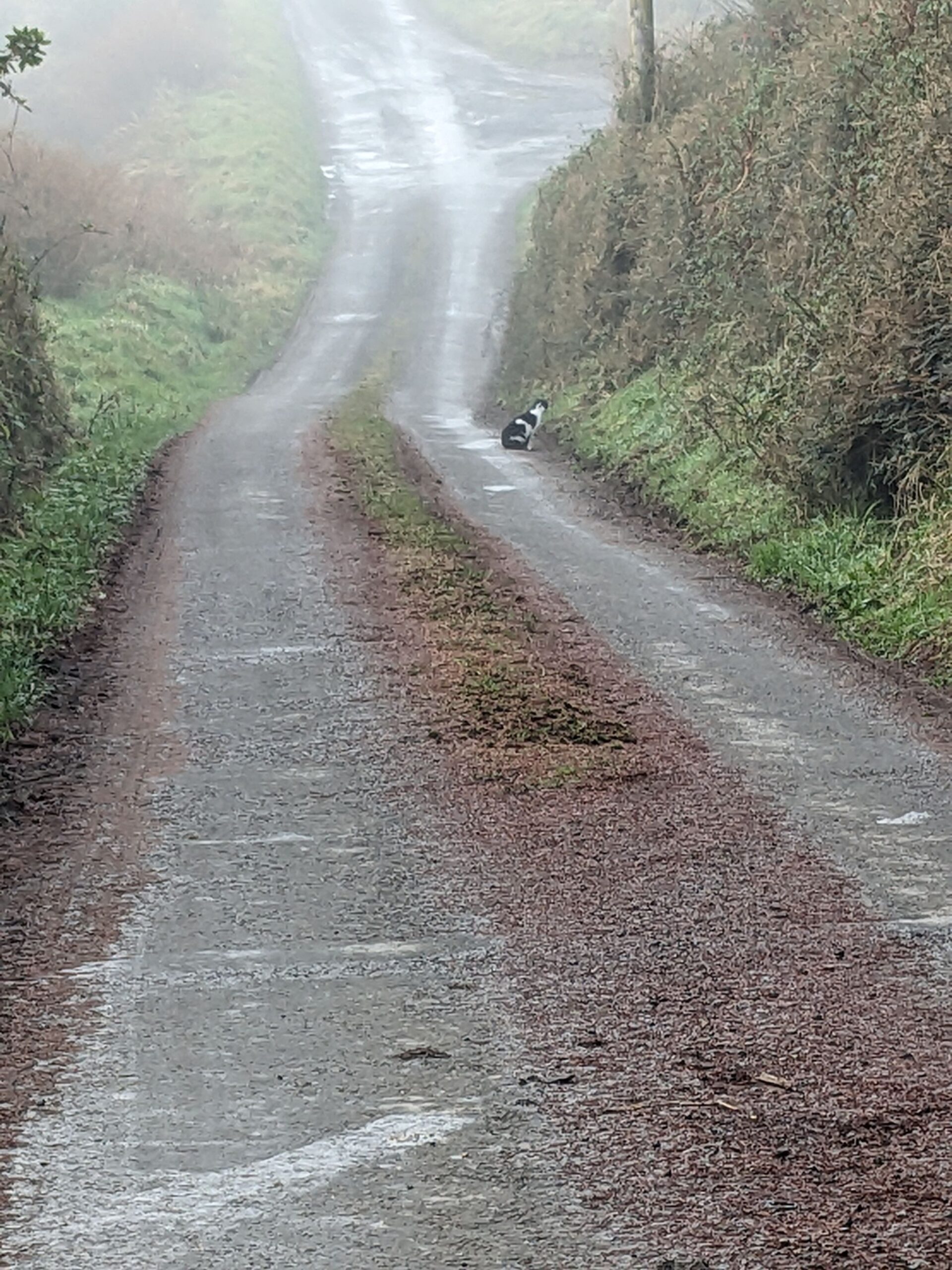
**
PS: So sorry it’s been a while since I’ve written a blog. Schoolwork for my archaeology diploma (see blog post https://wanderofwanders.com/index.php/2023/06/22/i-dig-my-newest-venture/) takes up a lot of my spare braincells, for sure. It seems every year during the summer and early fall, though, I am remiss in my blogging responsibilities. I will endeavor to be better!
In the meantime, have a wonderful and meaningful holiday season. I will be coming back to Maine for the first time since I moved to Ireland, and my daughter and son-in-law will be there, too, from Rwanda. It will be a festive Christmastime with my large, wonderful family.
Finally, if any of my readers from York, Maine are interested: I am going to lead an online Irish author book discussion group starting in January, through York Public Library. Check the library website for more information.

Reader Comments
What a wonderful, inspiring lady! Thank you for spot lighting her good work. I will hope to see you when you are “home” and check out your course! Safe journey.
I still miss our “Champ” who showed up on our door step when we first moved to Maine…..
Please give Rhona a hug and peck on the cheek for me. People like this, who make the world a better place one soul at a time, are true treasures.
I have never been a cat person but thoroughly enjoyed your description of Rhona. She’s obviously very devoted and caring person.
Happy Holidays to you Deborah; Thank you for the nice story of Rhonda and her kitties.
I am interested in the York Public Library Book group in January. I will be on an island off the coast of SC until the end of March and hopefully it will be available via Zoom.
Best wishes for you and your family